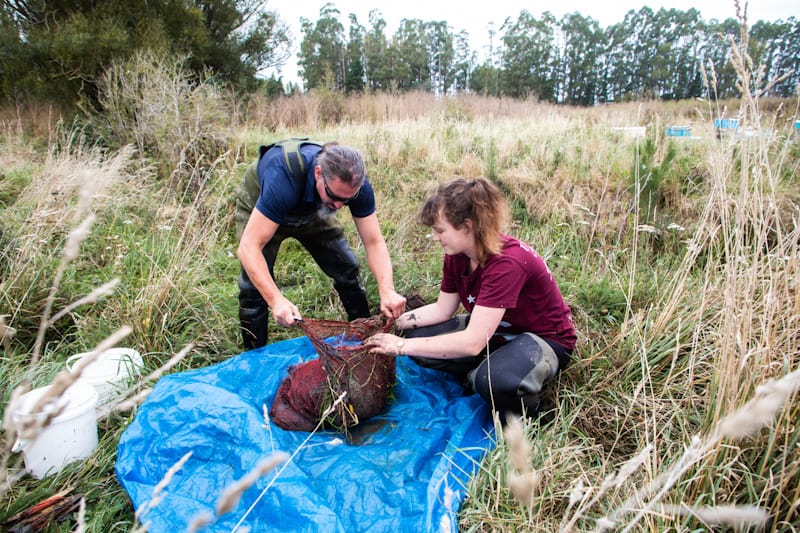Led by Associate Professor Tammy Steeves, the research programme was co-designed by scientists at the University of Canterbury and mana whenua Ngāi Tūāhuriri. They aimed to understand biocultural diversity of existing kēkēwai (freshwater crayfish) populations, and other species, and co-develop management plans that enhance their resilience to future challenges.
The research team ended up expanding across Te Waipounamu (the South Island) – ultimately including seven paptipu rūnanga across the Ngāi Tahu takiwā, Rūnanga o Ngāi Tahu (TRoNT), aquaculture company KEEWAI, Genomics Aotearoa, and Plant & Food Research.
Then PhD student, now Dr Aisling Rayne says the original relationships and research have been extended into several tribal-led research programmes.
“This includes a youth-focused project Kā Ara Tīpuna supported by MBIE’s Vision Mātauranga Capability (Connect) Fund,” she says.
“The programme brings together expertise and leaders in te ao Māori and Western science to reconnect Kāi Tahu rakatahi (youth) and whānui (communities) with ancestral pathways in the Central Otago region through revitalisation of knowledge, customary practices, and language.”
The team is also supporting He Pātaka a Tahu, a Ministry for Primary Industries Māori Agribusiness (MABx) research and development programme for land-based aquaculture of wai kōura (freshwater crayfish), to meet mahika kai and commercial aspirations.
Aisling says “Māori-led research and development of this emerging industry presents a unique opportunity to support capability and capacity development within rūnaka and whānau and explore the role of mātauraka and tīkaka Māori in contemporary aquaculture in Aotearoa NZ.”
Aisling herself is working as a Research Associate with her former supervisor Tammy, to facilitate an upcoming Kindness in Science workshop. She will soon begin a six-month research position based at the Centre of Sustainability (University of Otago) to conduct a thematic analysis aligned with the Kindness in Science project (Te Pūnaha Matatini).
Read more about the outputs from the Adaptive Evolution of Native Biota team:
- Collier-Robinson L, Rayne A, Rupene M, Thoms C, Steeves T. 2019. Embedding indigenous principles in genomic research of culturally significant species: A conservation genomics case study. New Zealand Journal of Ecology, 43(3), 3389.
- Rayne A, Byrnes G, Collier-Robinson, L, Hollows J, McIntosh A, Ramsden, M, Rupene, M, Tamati-Elliffe P, Thoms, C, Steeves TE. 2020. Centring Indigenous knowledge systems to re-imagine conservation translocations. People and Nature 2(3): 512-526.
- The Conversation article ‘When rehoming wildlife, Indigenous leadership delivers the best results’ following publication of Rayne et al. (2020).
- Invited Wiley blog ‘Centring Indigenous ways of knowing to enhance resilience’ following publication of Rayne et al. (2020).
- Interview for RNZ’s Our Changing World podcast ‘Collaborating to move freshwater species’
- Rayne A, Blair S, Dale M, Flack B, Hollows J, Moraga R, Parata RN, Rupene M, Tamati-Elliffe P, Wehi PM, Wylie MJ, Steeves TE (Under Review). Weaving place-based knowledge for culturally significant species in the age of genomics: Looking to the past to navigate the future. Evolutionary Applications.
